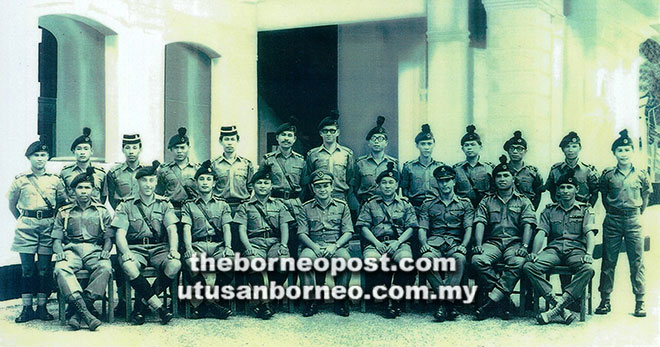
This photo – taken in 1974 – shows Johari looking smart in his uniform.

Johari poses for the camera during a tribute event at Dewan Bahasa dan Pustaka in Kuching. This photo was taken in 2013.

Johari (standing, fourth left) and fellow comrades gather for a group photo, taken on Feb 20, 1967 at the military camp in Taiping, Perak. At the time, the servicemen received a courtesy call from former Armed Forces chief General Tan Sri Mohd Sany Abdul Ghaffar (seated, centre) who was the Brigadier then.

Johari is now the secretary-general of Sarawak Rangers Veterans Association.
IN celebrating Malaysia Day on Sept 16, all Malaysians must always remember and acknowledge the courage and sacrifices of the retired soldiers.
For retired serviceman Capt Mohd Johari Ibrahim, every member of the Armed Forces deserves the honour and respect from all, regardless of ranks, in that they have sworn to safeguard and uphold the nation’s sovereignty – willing to give their lives to protect it.
“Without their sacrifices, the great nation of Malaysia would probably not exist.
“We fought in wars – some of us injured and some lost their lives. We took the bullets and bled for the country – that’s part of our duties. It’s sad that our fallen comrades would never have the chance to tell their stories,” he tells The Borneo Post in Kuching.
Johari, now 75 and is currently the secretary-general of Sarawak Rangers Veterans Association (SRVA), laments that the only acknowledgement of their bravery is engraved either on a memorial piece, a headstone or a piece of metal – hardly the apt recognition to compensate the sense of loss felt by their loved ones.
“We, the surviving comrades, can only recall the times and the struggles that we experienced together with our fallen brothers. Therefore, it is our obligation to speak for them, as well as for those who are still around,” he says.
No regrets
Johari retired from the force in 1975 after having served for 11 years. Nevertheless, he never regretted his choice of becoming a soldier.
At one time, he received the opportunity to enrol in the Royal Military Academy Sandhurst in the UK – a move that could have furthered his military career – but he chose to fight for the King and the country.
“Sometimes, I humour the probable outcome if I did enrol to Sandhurst – I would’ve been a high-ranking army officer. It (selection for Sandhurst) was something to be very proud of back then as very few members of the Sarawak army were given the chance to study at the most prestigious military college in the world.
“Nevertheless, I have no regrets. The duty to my King and my country comes first,” he says.
Johari points out that one of his most memorable times in the army was when he underwent a six-month training in Sungai Petani along with the Gurkha soldiers, where they were taught ‘guerrilla warfare’ by the British Army.
This was followed by another three-month ‘real training’ along the Malaysian-Thai border – for this stint, they were fighting against the communists.
“It was where we did the ‘jungle warfare’,” he adds.
Johari was also assigned for duty during the Malaysia-Indonesia Confrontation between the early and mid-1960s – at the time, there were threats to Sarawak coming from Kalimantan.
“After that, the communist insurgency came, threatening the sovereignty of Malaysia and Sarawak.”
All for nation’s sovereignty
Johari discloses that his first engagement with the enemy on Sarawak soil was in 1964, after his return home from training, when he was made second-lieutenant of the First Battalion of Malaysian Rangers at Sungai Tenggang in Simanggang – the present-day Sri Aman.
In the early 1970s, he became a military intelligence officer (MIO) in charge of Sarawak intelligence. He played a major role in the events that led to the surrender of Bong Kee Chok – the key figure of the Clandestine Communist Organisation (CCO), also known as the North Kalimantan Communist Party (NKCP) – and his comrades at Simanggang in 1973.
“The signing of the peace treaty between NKCP led by Bong Kee Chok and the Sarawak government, led by the third chief minister Tun Abdul Rahman Yakub, was beyond historic. It also changed the name of Simanggang to Bandar (Town) Sri Aman,” he says.
Johari, a native of Sri Aman himself, is glad that those turbulent years are over.
In this regard, he is also proud to see the gazettement of Sept 16 as a recognised nationwide public holiday – one that commemorates the formation of Malaysia consisting of Malaya, Sarawak, Sabah and Singapore, which later withdrew from the federation on Aug 9, 1965.
“I’m glad that the wrong was corrected,” he states, in reference to years of Aug 31 being observed as the Independence Day of Malaysia when the date actually marks the independence of Malaya from the British in 1957.
Back on Sarawak Rangers, Johari hopes that the government would continue to help these former servicemen who have served and sacrificed so much for the nation.
“We will always remain patriotic to our country – in our hearts, we are soldiers till our last breath, whether on the battlefield or not. We, the soldiers, never die – we would fight just like the Iban battlecry ‘Agi Idup Agi Neglaban’ (To Fight As Long As We Live),” he declares.
Recently, Johari was awarded the Darjah Utama Bintang Kenyalang, which carries the title ‘Pegawai Bintang Kenyalang’, in conjunction with the Head of State Tun Pehin Sri Abdul Taib Mahmud’s 81st birthday celebration this year.
The award is meant as recognition for his service and contribution in the force during the communist insurgency.
